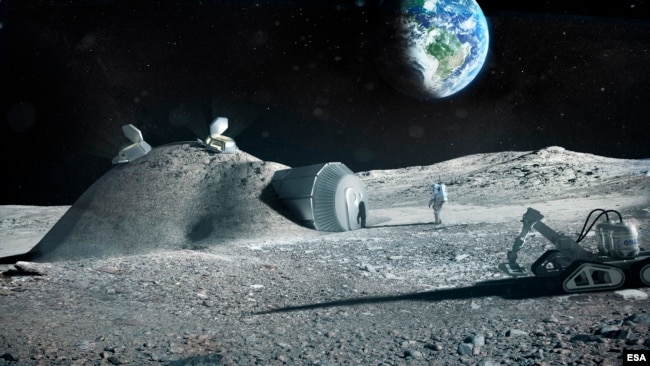月時間
こんなことが議論されているのですね。
独自の時間軸は、有効的に思います。
さて、これらの計画に乗り遅れないよう、日本のロケット技術工向上が望まれるところです。
VOAで英語を学びましょう!!
欧州宇宙機関、月に独自の時間帯を与えるよう要請(和訳)
European Space Agency Calls for Giving Moon its Own Time Zone
March 05, 2023
ヨーロッパの宇宙関係者が、月に別の時間帯を設けるよう呼びかけました。
欧州宇宙機関(ESA)によると、このアイデアはオランダにある同機関の宇宙研究技術センターで最近開かれた会合で話し合われたと言います。
ESAによると、この取り組みは、月のための完全な通信・ナビゲーションシステムを構築するための大規模なプロジェクトの一部であるということです。宇宙関係者によると、このようなシステムは、今後数年間に予定されている月への打ち上げをサポートするために必要であると言っています。
ESAは声明で、月周辺での一連の宇宙活動には、宇宙船と管制官が”一緒に通信し、地球から独立して位置を固定する”ことが必要だと述べています。現在、月の運用は、宇宙船を打ち上げた国の時刻で行われています。しかし、ESAの関係者は、より多くの国や民間宇宙企業が独自の月探査を開始した場合、これを変更する必要があると述べています。
ESAは、アメリカの宇宙機関であるNASAと提携して、いくつかの月探査プロジェクトやミッションを計画しています。ESAは、2020年代半ばまでにアメリカの宇宙飛行士を月へ送り届けることが期待されているNASAのオリオン宇宙船の製造を支援しました。NASAは昨年末、オリオンの最後の無人テストミッションに満足したと報告しています。
ESAはまた、Gatewayゲートウェイと呼ばれる月面プロジェクトの計画・開発業務にも携わっています。民間企業は、ゲートウェイプロジェクトの一環として、NASAとESAのために、ハビタットと呼ばれる居住空間を開発するよう要請されています。
※Gateway:
NASAはゲートウェイを、月周回軌道上に留まる小型宇宙船と説明しています。宇宙飛行士の居住空間として、また科学活動のための実験室として設計されます。ゲートウェイは、宇宙飛行士が月や、将来的には火星に行くための基地を提供することになります。
ピエトロ・ジョルダーノ氏は、ESAのナビゲーションシステムエンジニアです。最近のESAの会議でこの問題が検討された後、月のタイムゾーンを確立するための”国際的な共同作業が今、開始されている”と彼は述べました。
ESAは、計画されている月の通信システムやナビゲーションシステムは、”同じタイムスケールを採用することで、他の多くの有人・無人のミッションをサポートすることになり、より優れた性能を発揮することができる”と言います。
NASAもまた、国際宇宙ステーション(ISS)を設計・建設する際に、時間の問題に対処しなければなりませんでした。ISSは、最初のピースの打ち上げから25周年を迎えようとしています。
ISSには独自のタイムゾーンがありません。その代わり、原子時計の時刻を基にした協定世界時(UTC)で動いています。このため、NASAやカナダ宇宙庁、ロシア、日本、ヨーロッパの他の宇宙パートナーとの間の時差を緩和することができます。
ESAは、月の時間帯の確立を検討している国際チームは、単一の組織が月で時間を設定し、維持するべきかどうか議論している、と言います。
また、技術的な問題も考慮しなければなりません。例えば、月の時計は地球よりも速く動き、毎日約56マイクロ秒の誤差が生じると関係者はいいます。この確かな差は、時計の位置や軌道上か月表面かによって異なります。
ESAの関係者であるベルンハルト・フーフェンバッハ氏は、検討すべき最も重要なことの1つは、月で働く宇宙飛行士にとって、別の月時刻が役に立ち、効果的であるかどうかということであると述べています。
「これはかなり難しい課題です」とフーフェンバッハ氏は声明で述べています。彼は、月での1日は地球での29.5日と同じ長さであることを指摘しました。ヒューフェンバック氏は、月で実用的な時間システムを確立することに成功したら、”我々は他の惑星でも同じことをすることができる”と付け加えています。
European Space Agency Calls for Giving Moon its Own Time Zone
European space officials have called for establishing a separate time zone on the moon.
The European Space Agency (ESA) said the idea was discussed at a recent meeting held at the agency’s Space Research and Technology Centre in the Netherlands.
ESA said the effort is part of a larger project to create a complete communication and navigation system for the moon. Space officials say such a system will be necessary to support a growing number of planned launches to the moon in coming years.
A series of space operations around the moon will require spacecraft and controllers “to communicate together and fix their positions independently from Earth,” ESA said in a statement. Currently, moon operations run on the time of the country that launched the spacecraft. But ESA officials say this will have to change when more countries and private space companies start launching their own moon missions.
ESA has partnered with the American space agency NASA on several planned lunar projects, or missions. ESA helped build NASA’s Orion spacecraft, which is expected to transport American astronauts back to the moon by the mid-2020s. NASA reported it was pleased with Orion’s last uncrewed test mission late last year.
ESA has also been involved in planning and development operations for a lunar project called Gateway. Private companies have been asked to develop living spaces, called habitats, for NASA and ESA, as part of the Gateway project.
NASA has described Gateway as a small spaceship that would remain in orbit around the moon. It would be designed as a living space for astronauts and as a laboratory for science activities. Gateway would give the astronauts a base for making trips to the moon, and possibly in the future to Mars.
Pietro Giordano is a navigation system engineer for ESA. He said after the issue was considered at the recent ESA meeting, “a joint international effort is now being launched” to establish a lunar time zone.
ESA says the planned lunar communications and navigation systems will perform much better if they “employ the same timescale, along with the many other crewed and uncrewed missions they will support.”
NASA also had to deal with the time question while designing and building the International Space Station (ISS), which is nearing the 25th anniversary of the launch of its first piece.
The ISS does not have its own time zone. Instead, it runs on Coordinated Universal Time, or UTC, which is based on time kept by atomic clocks. This helps ease the time difference between NASA and the Canadian Space Agency, as well as other space partners in Russia, Japan and Europe.
ESA says the international team looking at establishing a lunar time zone is debating whether a single organization should set and keep time on the moon.
There are also technical questions to consider. For example, clocks run faster on the moon than on Earth, gaining about 56 microseconds each day, officials said. The exact difference depends on the position of the clock and whether it is in orbit or on the lunar surface.
One of the most important things to consider is whether separate lunar time will be helpful and effective for the astronauts working there, said ESA official Bernhard Hufenbach.
“This will be quite a challenge,” Hufenbach said in a statement. He noted that a day on the moon lasts as long as 29.5 days on Earth. Hufenbach added that after successfully establishing a working time system for the moon, “we can go on to do the same for other planetary destinations.”
Words in This Story
navigate – v. to find the right direction for traveling by using maps or other equipment
uncrewed –adj. (neologism) without a crew, not operated by people
time zone –n. one of the world’s 24 divisions where a certain time is officially observed
challenge – n. a difficult task or problem; something that is hard to do
destination – n. the place where someone or something is going
